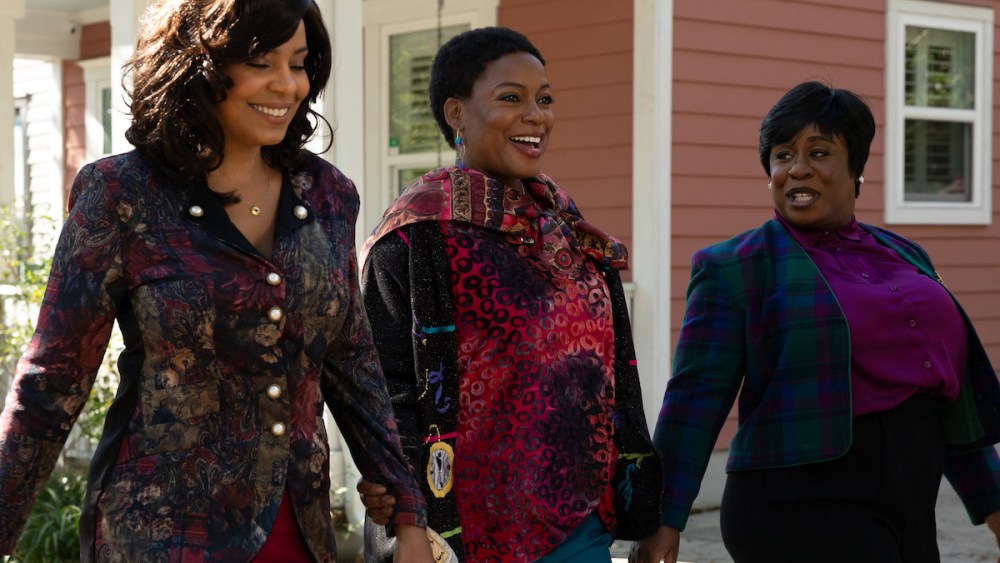‘The Supremes at Earl’s All-You-Can-Eat’ Review: Trio Sticks Together
It would be difficult to spoil one of most rousing scenes in “The Supremes at Earl’s All-You-Can-Eat,” if only because it figures mightily into the movie’s trailer. One gets the sense that director Tina Mabry doesn’t intend to spoil the fun either so much as emphasize the feisty fealty she practiced in adapting Edward Kelsey Moore’s 2013 novel, which centers on lifelong friends Odette, Clarice and Barbara Jean, who’ve dubbed themselves after the famous Motown trio. Mabry’s feelgood movie version is slated for an Aug. 23 release on Hulu.
“Born fearless,” Odette (Kyanna Simone) prepares to box the handsy stepfather of acquaintance Barbara Jean (Tati Gabrielle), who is as cowed as she is pretty. Her mother has just been buried, and Odette and her best friend Clarice (Abigail Achiri) have come bearing a grease-blotted box of fried chicken. When the stout teenager strips down to her bra and slip because, as she tells Clarice, “I don’t want blood all over my dress,” it’s a stand-up-and-cheer moment. The scene is soon followed by another intervention that changes Barbara Jean’s life and cements enduring friendship: Vast-hearted Earl (Tony Winters), whose restaurant is the center of the small-town community, and wife Thelma insist Barbara Jean move into their home.
While the actors cast in the roles of the young triumvirate are compelling, the ones who play the adult friends offer something of a talent bonanza for Mabry, directing just her second film. (After a powerful and personal debut feature, 2009’s “Mississippi Damned,” she’s worked in the television and streaming space.)
Aunjanue Ellis-Taylor portrays Odette, the movie’s centrifugal force. She starts things off ruminating about fate and destiny under a tree and not looking altogether well. She isn’t. Sanaa Lathan captures the ways beauty has been both a power and a vulnerability for Barbara Jean. As the gifted pianist (who now teaches piano in town) Clarice, Uzo Aduba makes clear that her character sees all when it comes to her philandering husband Richmond, and is becoming ruefully aware that she has lived too long a life of compromise. Needless to say, the three have had each other’s backs through the years’ joys (not so many) and sorrows (plenty).
The actors portraying their husbands do nuanced work, too. Vonnie Curtis-Hall is especially deft at signaling the love, valor and compassion Lester feels for younger wife Barbara Jean. He has to be; his time on screen is brief. Lester knows he was not Barbara Jean’s first choice, but has risen to the occasion. As Richmond, Russell Hornsby brings to the former football star the kind of charisma that invites judgment but also leaves room for hope. In other words, it’s a performance that puts us in Clarice’s uncomfortable shoes. He’s a cad, to be sure, but Hornsby wiggles some room for him. Mekhi Phifer proves sturdy and comforting as Odette’s deeply rooted, devoted mate, James. When Odette learns she’s ill, his response speaks volumes with a quiet firmness.
Yes, there will be infidelity and devotion, births and passings. For comedic relief, Earl’s second and lesser wife, Minnie (Sherry Richards), squawks her faux-spiritual prognostications. Credit Winters as Earl and Curtis-Hall for making such warm impressions that when their respective characters depart, each is dearly missed.
Watching the trinity of Odette, Clarice and Barbara Jean — with their complications and challenges — there’s a lot to enjoy in this adaptation, which Mabry co-wrote with Cee Marcellus (the pseudonym for “The Woman King” director Gina Prince-Bythewood). Still, that doesn’t mean fans of the book won’t be dispirited by some of the film’s choices.
Granted, readers are almost always broken up about changes and omissions. But if one didn’t know the novel’s nods both vigorous and playful to ghostly visitations and weekly churchgoing, you might imagine that the book is more in the vein of a Nicholas Sparks’ romance. Erring on the side of melodrama and period-piece reckoning, the film’s visual style adds to that sense.
And the love story between the wounded Barbara Jean and Ray “Chick” Carlson — or as he’s dubbed by Clarice, “the king of the pretty white boys” — hired by Earl as a busboy may cinch those feelings. Even so, Ryan Paynter locates in the wounded Chick a sweetness that remains in his adult counterpart. Julian McMahon continues the kindness once he returns to town 30 years later as a professor.
A movie that invites us to like and even root for all the vertices in a love triangle is laudable, but did leaving room for the interracial love story mean sacrificing something more intrinsic to the Supremes? In making sport of Minnie’s esoteric leanings while ditching the novel’s ghosts — and to a lesser degree the women’s churchgoing — something spiritual and arguably integral to these friends and their community got muted.
Still, there are moments of minor magic here. Deep friendship is among the most enchanting inventions after all. And Odette, Clarice and Barbara Jean show how to honor it.


